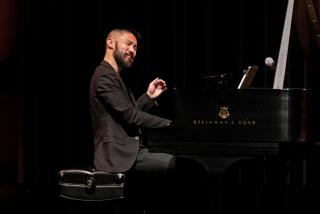Stravinsky by Stravinsky: Indispensable
- Share via
Yes, the listener can find more probing and certainly more neatly executed versions of some of the works in Sony Classical’s mammoth (22 CDs), costly ($300-plus) “Igor Stravinsky Edition.”
But you won’t find more of Stravinsky anywhere else: an overview of the career of arguably the most important composer of the 20th Century, beginning here with his lush, Rimsky-Korsakov-inspired Symphony of 1907 and ending with his sere serialism of the 1960s.
The bulk of this collection was produced in studio sessions from Stravinsky’s last decade (he died in 1971), the majority played by the Columbia Symphony, a pickup recording orchestra of Los Angeles Philharmonic and studio ringers.
Sony’s presentation is attractive and helpful, the CDs nestled in a sturdy plastic tray enclosed in a cardboard carrying case.
There are handsomely illustrated program notes, full texts for the vocal works and the clarification of old confusions about which works were in fact conducted by the composer’s associate and sometime alter ego, Robert Craft--they include “Chant du Rossignol,” “The Flood” and “Requiem Canticles.” There are as well revealing examples of Stravinsky in rehearsal, very much in command of his music and musicians, at age 80.
Some downright poor performances are to be found here, among them a stiff and cautious “Les Noces” and too-hastily-prepared versions of the late choral works “Threni” and “Canticum Sacrum.” Then, too, there are questionable choices among various recordings of the same work, notably the inclusion of the scrawny 1961 Washington Opera Society “Oedipus Rex” rather than the powerful Cologne Radio version of a decade earlier.
But the collection’s positive achievements are undeniable and its value should be obvious to a broader audience when the mass is broken down into affordably smaller segments, as is sure to happen.
The pleasures begin with the enchanting, 1913 one-act opera (begun in 1908) “Le Rossignol,” with Reri Grist singing the stratospheric convolutions of the title role with exquisite purity of tone under the composer’s sympathetic leadership.
There’s tremendous energy in the middle-period works that were particularly close to the composer’s heart in later years, “Jeu de Cartes” and “Orpheus” among them, while no one else has quite captured the pounding energy of the Symphony in Three Movements as the composer-conductor does here.
The complete “Baiser de la fee” receives a splendidly animated reading, with Louise di Tullio’s flute solos among its special attractions; the complete “Pulcinella” is lumpily led and coarsely sung.
The clever archaisms of the composer’s only full-length opera, “The Rake’s Progress,” are pungently delivered by the cast--Alexander Young, Judith Raskin and John Reardon are its principals--of this 1964 London studio recording, and there are comparable pleasures in the delectably nasty little barnyard fable, “Renard,” with George Shirley and Donald Gramm contributing star comic turns.
Opinions will remain divided over the businesslike readings of the complete “Oiseau de Feu” and “Petrushka,” but “Le Sacre du Printemps”--played with spectacular gusto by a New York-based pickup orchestra, also called Columbia Symphony--thunders across your head like a herd of rampaging elephants.
Stravinsky’s emphasis here, half a century after its premiere, is on the primal energy that made it a breakthrough composition.
Other conductors may talk about taking “Le Sacre” back to its primitive roots, but they seldom resist reveling in the lush lyricism that relates it to “L’Oiseau de Feu.” With Stravinsky himself in charge, “Le Sacre” is taut, fast and overwhelmingly, primitively, gloriously ferocious.
Among the valuable rarities in the collection is “Persephone,” the mid-1930s “dance melodrama” that joins the super-refined atmosphere of “Apollo” with the toughness of “Oedipus Rex”: an austere, fascinating creation, distinguished here by Vera Zorina’s heated recitation of Andre Gide’s text and Michele Molese’s heroic delivery of the tenor solos.
Everything in the set is worth mentioning, but space hardly permits. So, a few final bouquets:
To Isaac Stern for his joyously propulsive playing of the Violin Concerto; for the virtuosity of Los Angeles and New York chamber ensembles in, respectively, the Concertino for 12 Instruments and the wind Octet; for the crystalline work of the Festival Singers of Toronto in the “Symphony of Psalms” and Cathy Berberian’s incisive song performances. And for the charmingly scrappy playing by the composer and son Soulima of the Concerto for Two Solo Pianos, one of several 1930s historical recordings included in Sony’s monster-size marvel.
More to Read
The biggest entertainment stories
Get our big stories about Hollywood, film, television, music, arts, culture and more right in your inbox as soon as they publish.
You may occasionally receive promotional content from the Los Angeles Times.










